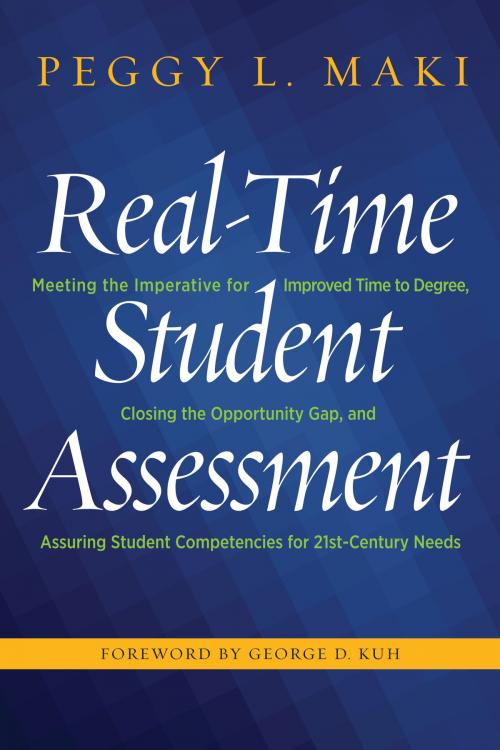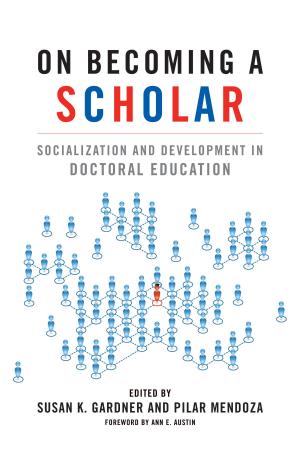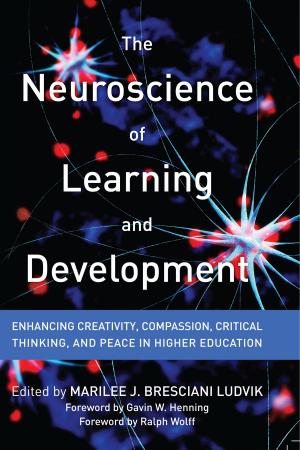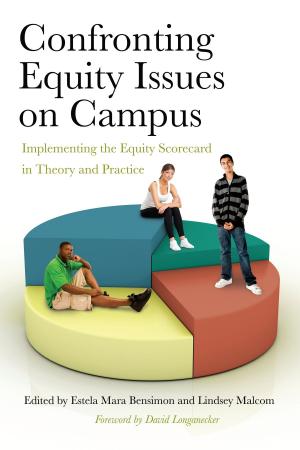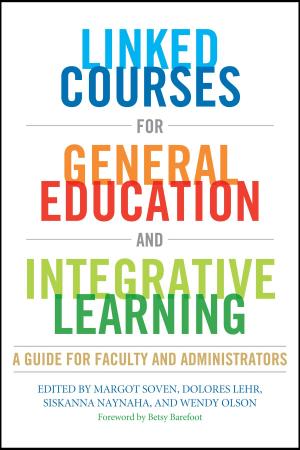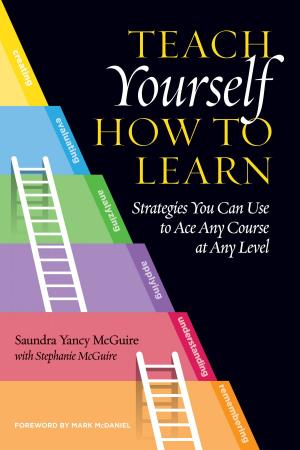Real-Time Student Assessment
Meeting the Imperative for Improved Time to Degree, Closing the Opportunity Gap, and Assuring Student Competencies for 21st-Century Needs
Nonfiction, Reference & Language, Education & Teaching, Higher Education| Author: | Peggy L. Maki | ISBN: | 9781620364901 |
| Publisher: | Stylus Publishing | Publication: | February 27, 2017 |
| Imprint: | Stylus Publishing | Language: | English |
| Author: | Peggy L. Maki |
| ISBN: | 9781620364901 |
| Publisher: | Stylus Publishing |
| Publication: | February 27, 2017 |
| Imprint: | Stylus Publishing |
| Language: | English |
This book challenges institutions and their programs to prioritize the use of chronological assessment results to benefit enrolled students in comparison with the more common practice of prolonged assessment cycles that generally benefit future students.
Peggy Maki advocates for real-time assessment processes to identify patterns of underperformance and obstacles that require timely interventions for enrolled students to succeed.
In tandem with the sets of educational practices and policies that many institutions have now undertaken to close achievement and graduation rates across our diverse student demographics, such as developing clear degree pathways, she calls on all higher education providers – if they are to remain relevant and meet their social purpose in our complex world – to urgently recalibrate their assessment processes to focus on currently enrolled students’ progress towards achieving a high-quality degree, regardless of when they matriculate or re-enter higher education.
She demonstrates that we already have sufficient examples and evidence to implement real-time assessment of students as they progress through their studies. She draws on the practices of specialized accredited programs, such as those in the professions that assess in real time; on the experiences of institutions that have adopted competency-based education; and on the affordances of technologies that now provide faculty and students with up-to-the-minute diagnostics.
She identifies the six principles necessary to implement a real-time assessment process, illustrated by case studies of how campuses have operationalized them to advance students’ equitable progress towards achieving a high-quality degree; and demonstrates the benefits of real-time assessment compared to more future-oriented processes, among which is engaging students in reflecting on their own progress along their degree pathways.
She advocates for the use of well documented national outcomes-based frameworks such as Liberal Education and America’s Promise (LEAP), its aligned Valid Assessment of Learning in Undergraduate Education scoring rubrics ( VALUE), the Degree Qualifications Profile, and discipline-based outcomes assessments to ensure high-quality degrees that meet well-defined standards and criteria. She also identifies how data systems and technological developments help to monitor closely and respond in time to students’ patterns of underperformance.
The book is an urgent call for higher education to achieve the values of equity, transparency and quality it espouses; and ensure that all students graduate in a timely fashion with the competencies they need to be active and productive citizens.
This book challenges institutions and their programs to prioritize the use of chronological assessment results to benefit enrolled students in comparison with the more common practice of prolonged assessment cycles that generally benefit future students.
Peggy Maki advocates for real-time assessment processes to identify patterns of underperformance and obstacles that require timely interventions for enrolled students to succeed.
In tandem with the sets of educational practices and policies that many institutions have now undertaken to close achievement and graduation rates across our diverse student demographics, such as developing clear degree pathways, she calls on all higher education providers – if they are to remain relevant and meet their social purpose in our complex world – to urgently recalibrate their assessment processes to focus on currently enrolled students’ progress towards achieving a high-quality degree, regardless of when they matriculate or re-enter higher education.
She demonstrates that we already have sufficient examples and evidence to implement real-time assessment of students as they progress through their studies. She draws on the practices of specialized accredited programs, such as those in the professions that assess in real time; on the experiences of institutions that have adopted competency-based education; and on the affordances of technologies that now provide faculty and students with up-to-the-minute diagnostics.
She identifies the six principles necessary to implement a real-time assessment process, illustrated by case studies of how campuses have operationalized them to advance students’ equitable progress towards achieving a high-quality degree; and demonstrates the benefits of real-time assessment compared to more future-oriented processes, among which is engaging students in reflecting on their own progress along their degree pathways.
She advocates for the use of well documented national outcomes-based frameworks such as Liberal Education and America’s Promise (LEAP), its aligned Valid Assessment of Learning in Undergraduate Education scoring rubrics ( VALUE), the Degree Qualifications Profile, and discipline-based outcomes assessments to ensure high-quality degrees that meet well-defined standards and criteria. She also identifies how data systems and technological developments help to monitor closely and respond in time to students’ patterns of underperformance.
The book is an urgent call for higher education to achieve the values of equity, transparency and quality it espouses; and ensure that all students graduate in a timely fashion with the competencies they need to be active and productive citizens.
